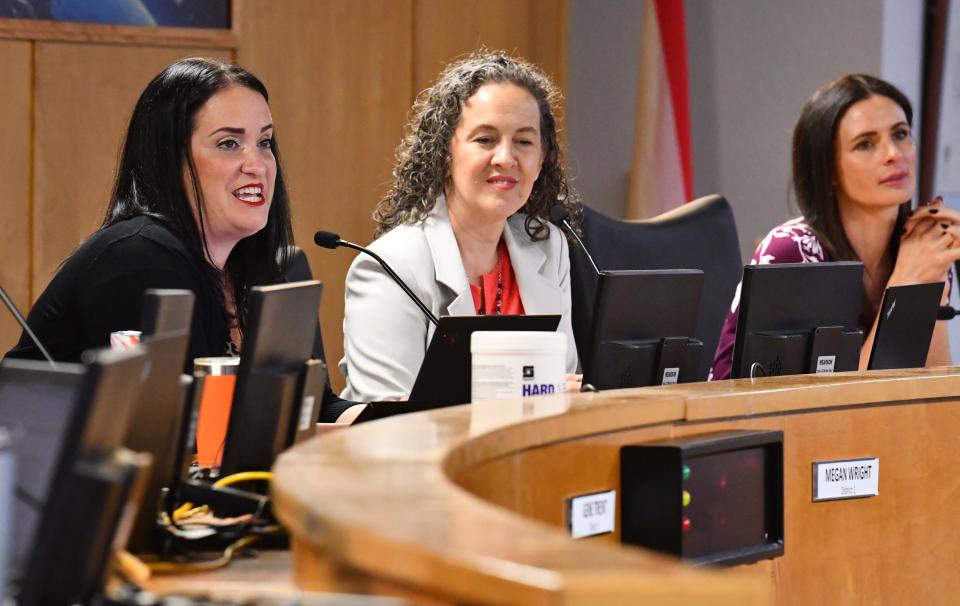Brevard Schools discipline data: Overall rates this year up from last, suspensions down
A school year's-worth of data shows that while discipline rates overall went up in Brevard Public Schools, suspensions dropped. And the rates of discipline have continued to be disproportionately doled out — something community members have decried for years.
The data was presented at a work session this week, where most board members touted the district's updated procedures for sending a message that bad behavior won't be tolerated.
Board Chair Megan Wright said she "wants Brevard County to be the Georgia (of school districts)."

"Everybody that drives on (Interstate) 95 knows the second you hit Georgia, you stop speeding, because you know why? They write tickets, and you get in trouble," she said. "I would like our schools to be the Georgia, so to speak, when it comes to discipline."
Members Jennifer Jenkins and Katye Campbell, however, urged the district to put more focus on helping students resolve their behavioral issues.
Over the course of the 2023-2024 school year, Brevard Public Schools worked to implement new practices surrounding the discipline referral process in the hopes that classes would be calmer and the process would become smoother.
A big change has been the requirement of teachers to submit referrals in a shorter period of time than in previous years, a change that came following a March 2023 audit of the district's discipline processes.
Jenkins thinks more needs to be done to address the disproportionate rates of discipline impacting Black students and those on free and reduced lunches — an issue that other board members have been largely defensive of over the past year, or have been outright unwilling to discuss.
"There is a blindness from this board to have conversations about the data that has been presented over and over again," Jenkins said. "There (are) excuses being made by the majority of this board over and over again, and it's frustrating — it's frustrating because there is a huge sector of our population of students that are being ignored."
More: Discipline trends still show disproportionate rates for Black Brevard students in 2023-'24
Little comment was made by other board members directly regarding the disproportionality, though Matt Susin pointed to Assistant Superintendent of Student Services Pamela Dampier's improvement plans that looks at each school and student. He praised Dampier for her work, saying she's brought support inside the schools with Brevard Federation of Teachers.
"Your No. 1 thing that you consistently say is, 'We need to figure out the data, hold everybody accountable but then find the supports that are needed to help these children,'" Susin said to Dampier. "You are in the schools, you're meeting with the schools, you're bringing BFT to the schools, you're doing a lot of that stuff, and that was not something that was evident before."
Discipline referrals up, but suspensions down
Overall, 95,814 referrals were given to 21,426 students during the 2023-2024 school year. That's an increase of nearly 13,000 referrals from the previous year, when 82,995 referrals were given to 18,484 students.
Despite the increase in referrals, in- and out-of-school suspensions dropped from the previous year. During the 2023-2024 school year, there were 29,890 out-of-school suspensions and 9,218 in-school suspensions, with principals now using lunchtime detentions as an alternative. The previous year, there were 30,779 out-of-school suspensions and 11,732 in-school suspensions.
The type of behavior causing the most number of discipline referrals for both years was "willful disobedience," holding the No. 1 spot out of the top 10 most often seen behaviors for both years. There were slightly fewer referrals for this behavior during 2023-2024 than the previous year, with 13,514 referrals compared to 14,520 referrals during the 2022-2023 school year.
Certain groups still disproportionately impacted
Following trends presented in quarterly data, discipline rates for certain demographics increased, with Black students and those on free and reduced lunches being subject to the most discipline.
Risk ratio is a measure used by the state to determine is a district is "at risk" based on the number of suspensions within a given demographic. The goal is for every demographic to be at 1.0, while a ratio of 2.5 is an "alert status," and a ratio of 3.0 is when action must take place to rectify the situation.
The risk ratio fell during the 2023-2024 school year for white and Hispanic students. It increased for every other demographic, which included non-gifted special education students, students on free or reduced lunches, English language learners, multiracial students, Black students, Asian students and American Indian or Alaska Native students.
More: 'Bad data with no plan': Discipline rates against Black students remain steady in Brevard
Students on free or reduced lunches remained over a 2.5 risk ratio, increasing this year to a 2.7228. Black students were just shy of the 2.5 risk ratio, with a risk ratio of 2.4589.
English language learners, white, Hispanic, Asian and American Indian or Alaska Native students all had risk ratios below 1.
Board in disagreement about data
Jenkins was quick to point out that both Black students and students on free and reduced lunches have continually had the highest risk ratios, and that the issue has gone unaddressed.
"When we have certain demographics and populations of students that are coming up on these data charts at a significantly higher percentage than the percentage that they represent within the population of our schools, that tells us we have a problem," she said.
She brought up those numbers in the context of student behavior and achievement, saying they needed to dive in to them.
"It is our responsibility to dive deep into those numbers and understand the why, and understand what kind of resources and supports we can put into those schools or to those specific students in order to change it," Jenkins said. "That is our job."

Campbell agreed that it would be "egregious" if any demographic were being punished unfairly, but she wasn't sure if the data represented that happening.
"It's not being ignored," she said. "If there are significant discrepancies, that's probably some data specifically that we need to look at, because I don't want to just broad statements without being able to know exactly what we're talking about."
Board Vice Chair Gene Trent felt the higher rates of discipline correlated with the preliminary student achievement data presented at the work session, which showed an increase in achievement.
"If you take care of the small things, sometimes it takes care of the big things," he said. "I don't have expectations of certain numbers going down. I want teachers and administrators to continue doing what they do with the situations that they're faced (with) every single day."
Finch Walker is the education reporter at FLORIDA TODAY. Contact Walker at [email protected]. X: @_finchwalker.
This article originally appeared on Florida Today: Board: What's behind higher rates of discipline in Brevard schools?
